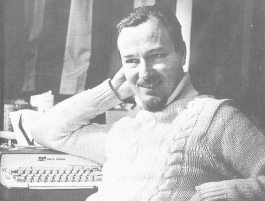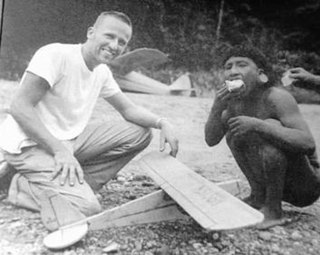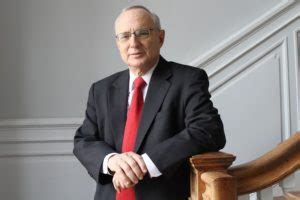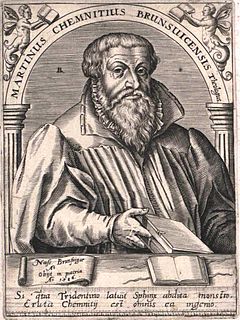A Quote by John Locke
Probability is a kind of penance, which God made, suitable, I presume to that state of mediocrity and probationership he has been pleased to place us in here; wherein, to check our over-confidence and presumption, we might, by every day's experience, be made sensible of our short-sightedness, and liableness to error.
Related Quotes
Every day God invites us on the same kind of adventure. It's not a trip where He sends us a rigid itinerary, He simply invites us. God asks what it is He's made us to love, what it is that captures our attention, what feeds that deep indescribable need of our souls to experience the richness of the world He made. And then, leaning over us, He whispers, "Let's go do that together.
But that Franklin trip changed me profoundly. As I believe wilderness experience changes everyone. Because it puts us in our place. The human place, which our species inhabited for most of its evolutionary life. That place that shaped our psyches and made us who we are. The place where nature is big and we are small.
That reality is 'independent' means that there is something in every experience that escapes our arbitrary control. If it be a sensible experience it coerces our attention; if a sequence, we cannot invert it; if we compare two terms we can come to only one result. There is a push, an urgency, within our very experience, against which we are on the whole powerless, and which drives us in a direction that is the destiny of our belief.
Lent is like a long 'retreat' during which we can turn back into ourselves and listen to the voice of God, in order to defeat the temptations of the Evil One. It is a period of spiritual 'combat' which we must experience alongside Jesus, not with pride and presumption, but using the arms of faith: prayer, listening to the word of God and penance. In this way we will be able to celebrate Easter in truth, ready to renew the promises of our Baptism.
I saw full surely that ere God made us He loved us; which love was never slacked, nor ever shall be. And in this love He hath done all His works; and in this love He hath made all things profitable to us; and in this love our life is everlasting. In our making we had beginning; but the love wherein He made us was in Him from without beginning: in which love we have our beginning. And all this shall we see in God, without end.
We've been slaves to our tools since the first caveman made the first knife to help him get his supper. After that there was no going back, and we built till our machines were ten million times more powerful than ourselves.
We gave ourselves cars when we might have learned to run; we made airplanes when we might have grown wings; and then the inevitable. We made a machine our God.
We hear of the conversion of water into wine at the marriage in Cana as of a miracle. But this conversion is, through the goodness of God, made every day before our eyes. Behold the rain which descends from heaven upon our vineyards, and which incorporates itself with the grapes, to be changed into wine; a constant proof that God loves us, and loves to see us happy.
Our virtues themselves are not free and floating qualities over which we retain a permanent control and power of disposal; they come to be so closely linked in our minds with the actions in conjunction with which we have made it our duty to exercise them that if we come to engage in an activity of a different kind, it catches us off guard and without the slightest awareness that it might involve the application of those same virtues.
If God would grant us the vision, the word sacrifice would disappear from our lips and thoughts; we would hate the things that seem now so dear to us; our lives would suddenly be too short, we would despise time-robbing distractions and charge the enemy with all our energies in the name of Christ. May God help us ourselves by the eternities that separate the Aucas from a Comprehension of Christmas and Him, who, though he was rich, yet for our sakes became poor so that we might, through his poverty, be made rich.
When we try to imagine what God is like we must of necessity use that-which-is-not- God as the raw material for our minds to work on; hence whatever we visualize God to be, He is not, for we have constructed our image out of that which He has made and what He has made is not God. If we insist upon trying to imagine Him, we end with an idol, made not with hands but with thoughts; and an idol of the mind is as offensive to God as an idol of the hand.
In a state of tranquility, wealth, and luxury, our descendants would forget the arts of war and the noble activity and zeal which made their ancestors invincible. Every art of corruption would be employed to loosen the bond of union which renders our resistance formidable. When the spirit of liberty which now animates our hearts and gives success to our arms is extinct, our numbers will accelerate our ruin and render us easier victims to tyranny.
... we did decide to trust Christ, but the reason we made that decision is that God had first made us spiritually alive. ... God comes to us when we're spiritually dead, when we don't even realize our condition, and gives us the spiritual ability to see our plight and to see the solution in Christ. God comes all the way, not partway, to meet us in our need. When we were dead, He made us alive in Christ. And the first act of that new life is to turn in faith to Jesus.
Interestingly, God's remedy for Elijah's depression was not a refresher course in theology but food and sleep... Before God spoke to him at all, Elijah was fed twice and given a good chance to sleep. Only then, and very gently, did God confront him with his error. This is always God's way. Having made us as human beings, He respects our humanness and treats us with integrity. That is, He treats us true to the truth of who we are. It is human beings and not God who have made spirituality impractical.
We have the right to rid our houses of ants; but what we have no right to do is to forget to honor the ant as God made it, out in the place where God made the ant to be. When we meet the ant on the sidewalk, we step over him. He is a creature, like ourselves; not made in the image of God, it is true, but equal with man as far as creation is concerned. The ant and the man are both creatures.








































